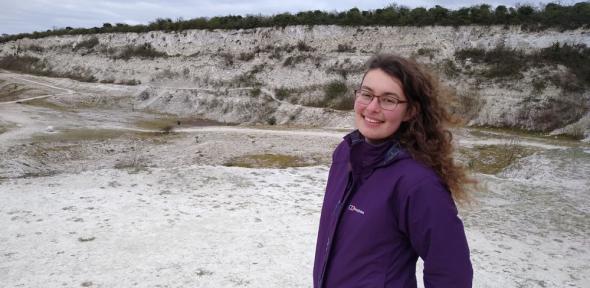
Kasia Warburton is a PhD student in the Theoretical Geophysics research group at the Department of Applied Mathematics and Theoretical Physics. Here she tells us about her work on glaciers, the joys of collaboration, and the excitement of moments when things click into place.
In my research I am applying ideas from fluid dynamics to study the flow of glaciers in Antarctica. It might be strange to think about glaciers as fluids, but they actually move like a viscous fluid, such as honey or golden syrup, over really rough topography. There is also a layer of water or wet mud between the base of the ice and the ice itself, so the ice doesn't just flow it also slides. Nobody knows what controls how quickly it is sliding, so my work is trying to better understand the processes involved.
"The Mathematics Faculty is a lovely place to work because everyone talks to everyone else." Kasia Warburton
A major application is to understand how glaciers respond to climate change. If we can get better models of glacier flow we can get better predictions of their contribution to sea-level rise, for example.
All of fluid dynamics is based on the Navier-Stokes equations. The main equation I use is a simpler version called the Stokes equation which describes very slow and sticky flows. I also look at flows through porous media, using Darcy's law which describes how easily water can flow through a grainy or sandy material.
I did my mathematics undergraduate degree at Cambridge and really enjoyed the applied maths side of it. I like the fact you have this governing set of equations, but they are too hard to solve to make any progress, so you have to think physically about what approximations you can make — what's relevant and what you can throw out. That balance between the physical and mathematical is really nice.
I did lots of fluid dynamics in Part III and there was this course called Fluid Dynamics of the Solid Earth which is about how we can use ideas from fluid dynamics to actually model observations on a planetary scale. That just seemed more interesting to me than maths for maths' sake.
The Mathematics Faculty is a lovely place to work because everyone talks to everyone else. I am in an office with two other PhD students with the same supervisor. There is a lot of collaboration in the office, and there is a lot of collaboration in the pavilion — everyone has their doors open and we all have coffee together at 11am every day.
A typical day for me starts by coding, analysing my code's output, or writing up results. There's also usually a seminar at lunchtime, which I go to, and then my afternoons are more varied: meeting my supervisor discussing results, or supervising undergraduates and marking their work. I enjoy teaching undergraduates a lot!
One of my favourite mathematical moments was when I thought there was a bug in my code. I was getting a small offset from my initial predictions. I then went down for coffee and described the problem to one of the professors sitting there. He said it reminded him of something which we had also studied in Part III, and I remembered doing the calculations on an example sheet. I thought 'maybe a similar analysis will work here' — and it did! A page of working, and I'd suddenly explained the offset and all the points lined up on the graph!
When I have finished my PhD I will stay in academia. In August I will be going off to Dartmouth in the US for two years to do a post-doctoral fellowship there. Then I will come back to take up a Junior Research Fellowship at Trinity College here in Cambridge.
To someone who is thinking of studying mathematics I would say that you really have to want to do maths. It has to excite you enough that you wake up in the morning and say 'ah, some maths, yes I want to do that'. To an undergraduate I'd say to make sure to stay on top of your weekly tasks — term goes by so quickly. To someone doing a PhD I'd say to choose a supervisor who is someone you're happy to talk to on a day-to-day basis, who is someone who will inspire you, and who you're comfortable having tough conversations with when you are stuck.
